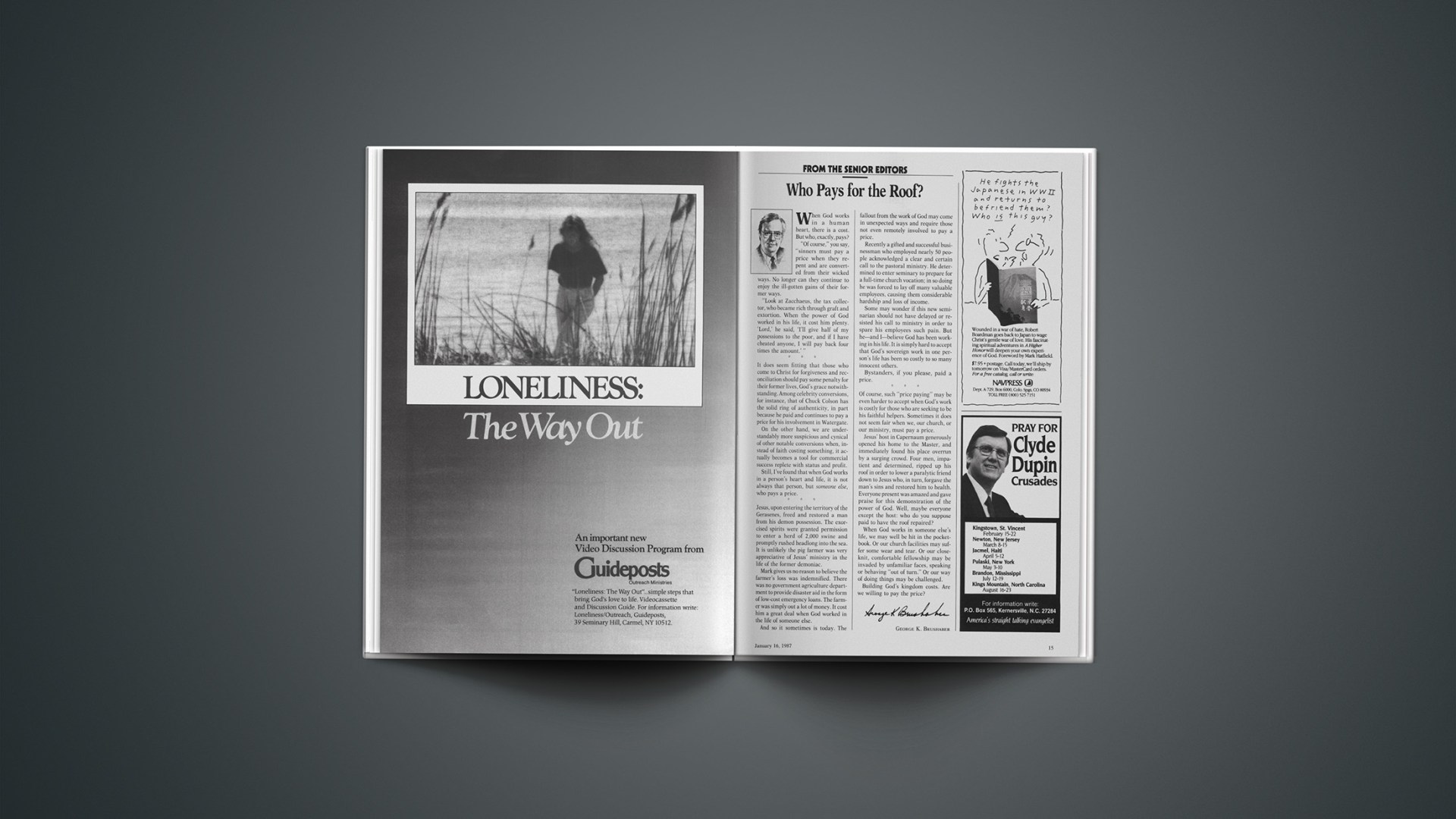When God works in a human heart, there is a cost. But who, exactly, pays?
“Of course,” you say, “sinners must pay a price when they repent and are converted from their wicked ways. No longer can they continue to enjoy the ill-gotten gains of their former ways.
“Look at Zacchaeus, the tax collector, who became rich through graft and extortion. When the power of God worked in his life, it cost him plenty. ‘Lord,’ he said, ‘I’ll give half of my possessions to the poor, and if I have cheated anyone, I will pay back four times the amount.’ ”
It does seem fitting that those who come to Christ for forgiveness and reconciliation should pay some penalty for their former lives, God’s grace notwithstanding. Among celebrity conversions, for instance, that of Chuck Colson has the solid ring of authenticity, in part because he paid and continues to pay a price for his involvement in Watergate.
On the other hand, we are understandably more suspicious and cynical of other notable conversions when, instead of faith costing something, it actually becomes a tool for commercial success replete with status and profit.
Still, I’ve found that when God works in a person’s heart and life, it is not always that person, but someone else, who pays a price.
Jesus, upon entering the territory of the Gerasenes, freed and restored a man from his demon possession. The exorcised spirits were granted permission to enter a herd of 2,000 swine and promptly rushed headlong into the sea. It is unlikely the pig farmer was very appreciative of Jesus’ ministry in the life of the former demoniac.
Mark gives us no reason to believe the farmer’s loss was indemnified. There was no government agriculture department to provide disaster aid in the form of low-cost emergency loans. The farmer was simply out a lot of money. It cost him a great deal when God worked in the life of someone else.
And so it sometimes is today. The fallout from the work of God may come in unexpected ways and require those not even remotely involved to pay a price.
Recently a gifted and successful businessman who employed nearly 50 people acknowledged a clear and certain call to the pastoral ministry. He determined to enter seminary to prepare for a full-time church vocation; in so doing he was forced to lay off many valuable employees, causing them considerable hardship and loss of income.
Some may wonder if this new seminarian should not have delayed or resisted his call to ministry in order to spare his employees such pain. But he—and I—believe God has been working in his life. It is simply hard to accept that God’s sovereign work in one person’s life has been so costly to so many innocent others.
Bystanders, if you please, paid a price.
Of course, such “price paying” may be even harder to accept when God’s work is costly for those who are seeking to be his faithful helpers. Sometimes it does not seem fair when we, our church, or our ministry, must pay a price.
Jesus’ host in Capernaum generously opened his home to the Master, and immediately found his place overrun by a surging crowd. Four men, impatient and determined, ripped up his roof in order to lower a paralytic friend down to Jesus who, in turn, forgave the man’s sins and restored him to health. Everyone present was amazed and gave praise for this demonstration of the power of God. Well, maybe everyone except the host: who do you suppose paid to have the roof repaired?
When God works in someone else’s life, we may well be hit in the pocket-book. Or our church facilities may suffer some wear and tear. Or our close-knit, comfortable fellowship may be invaded by unfamiliar faces, speaking or behaving “out of turn.” Or our way of doing things may be challenged.
Building God’s kingdom costs. Are we willing to pay the price?
GEORGE K. BRUSHABER










